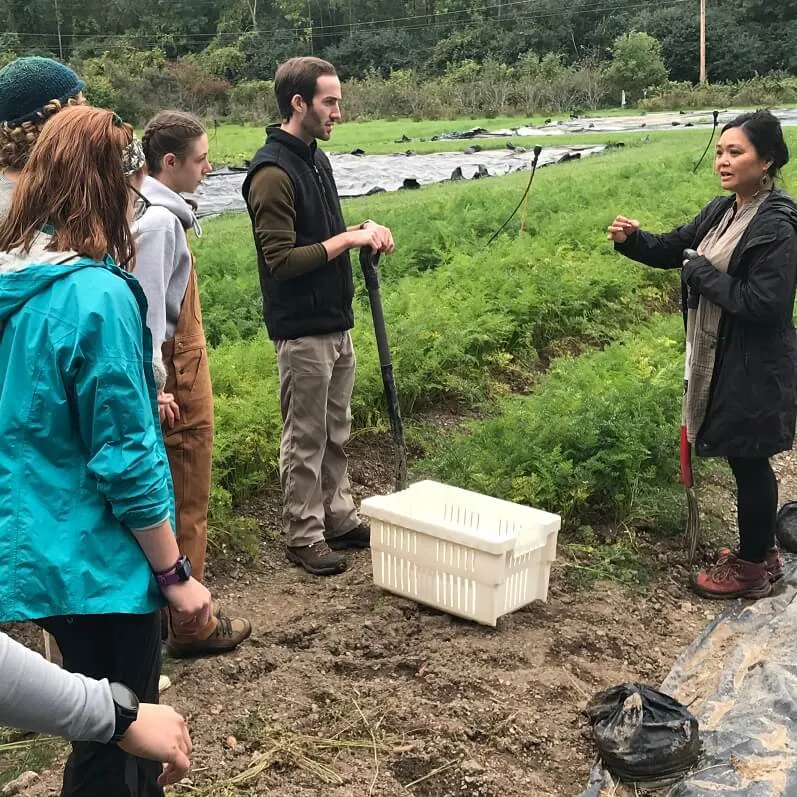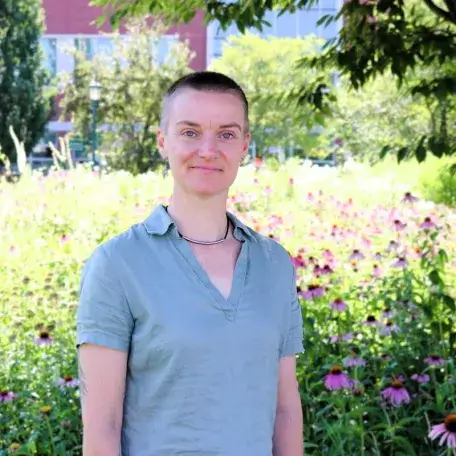Our community partners have been involved in Rubenstein School internships and service-learning courses. There are multiple ways to interact with our students and we can help you determine the best type of student collaboration for your organization.
Internships
Overview
The Rubenstein School Internship Program engages with site partners in a variety of ways. Students can be in paid or unpaid internships and either earn or not earn academic credit associated with the experience. At the lowest level of oversight and support, students are engaging in the experience and not earning credit. At the next level of oversight and support, students are earning credit for the experience, either to be eligible for funding or to go towards their degree. The highest level of oversight and support is through the Rubenstein Perennial Internship Program, which is a cost-share program between Rubenstein and the site partner, involving trainings, check ins, and academic credit of the student intern.
Internships that involve academic credit should be skill-based for student growth and they require a formal Experiential Learning Plan (a 4-way agreement between the Rubenstein School Experiential and Community-Based Coordinator, a faculty advisor, the student, and the community partner) and involve an MOU. Students are required to work, at minimum, 45 hours per credit earned.
Working with UVM
Recruiting Interns
Working with and Supporting Interns
This is an ever-evolving list of resources. If you see something that you have questions about or if you have resources that you would like to share, please contact the Rubenstein School's Experiential and Community-Based Learning Coordinator, Sarah Mell.
Gender/LGBTQIA+ Resources:
- Gender & The Economy: A survey of policies and practices for trans-inclusive workplaces
- Pride at Work Canada: Hiring Across All Spectrums: A Report on Broadening Opportunities for LGBTQ2+ Jobseekers
- Creating Authentic Spaces: A Gender Identity and Gender Expression Toolkit
Anti-Racism Resources:
- Time’s Up: Building an Anti-Racist Workplace (Full equity guide linked on page)
- Anti-racist/Anti-bias Recruitment and Hiring Practices
- Forbes: 5 Anti-Racist Hiring Practices Every Employer Should Adopt
Accessibility Resources:
- UGuelph Experiential Learning Hub: Academic Accommodations Translated into Employment Settings (i.e. applications, interviews and workplace)
- American Psychological Association: Providing Reasonable Accommodations to Individuals with Disabilities in Internship Sites and Postdoctoral Internship Positions
- Managing your Career: Strategies for Students with Disabilities – Module Learning
Equity-Based Resources
Service-Learning Courses
Overview
Service-learning is a teaching pedagogy that combines service in the community with classroom instruction, with a focus on personal reflection and the development of civic and personal responsibility.
Courses are taught by Rubenstein School faculty each academic year in collaboration with many different community partners. The majority of service-learning courses are taught during the fall and spring semesters. Service-learning projects can vary in scale and scope from small, focused, one-time projects to semester-long, broad, and ongoing projects that adapt and allow for collaboration between students and community partners.
These projects are unpaid and are associated with a specific UVM course. Projects should define a specific need identified by a community partner and can involve small groups of students or entire classes. For more information on service-learning partnerships or if you are interested in getting connected with Rubenstein faculty and courses, contact Sarah Mell.
Environmental Studies Internship Capstone
Overview
RSENR undergraduates that are Environmental Studies majors must meet the requirements of the Environmental Studies Program (ENVS) at UVM. ENVS internships are intended for students who would like to apply their interdisciplinary environmental skills and knowledge in an organizational setting.
ENVS Senior Capstone Internships:
- Are for senior or advanced level activities
- Count for 6 credits of upper level senior work, and is partnered with an upper-level environmentally relevant course
- Should account for at least 200 hours of work with the sponsoring organization (approximately 45 hours for each credit earned)
- Can be paid or unpaid
- Requires students to write an in-depth senior internship capstone proposal and a final write- up documenting and evaluating internship experience
Is directly overseen by a Field Site Supervisor who is asked to provide written comments and an evaluation or grade (grade sheet is provided by student). More information on field supervisor requirements here.
For more information visit the College of Arts and Sciences ENVS Internship Capstone Webpage or contact Internship Capstone Coordinator Vic Izzo.
Volunteer Opportunities
Overview
Community partners may also be interested in recruiting volunteers for one-time events or ongoing support through the Rubenstein School. Our capacity for organization volunteer opportunities is limited, though we can spread the word through our student listserv and building bulletin boards.
There also may be opportunities to coordinate with Rubenstein School student clubs, such as the Student Advisory Board (RSENRsab@uvm.edu) or directly through faculty aligned with projects. Community partners interested in recruiting volunteers can also reach a broader student base by contacting UVM Student Life Civic Engagement.
Past and Current Partners
Community Partners
- Ascension Lutheran Church
- Baltimore Green Space
- Bolton Valley
- Branch Out Burlington
- Bread and Butter Farm
- Burlington Co-Housing
- Burlington Conservation Board
- Burlington Electric Department
- Burlington High School
- Burlington Legacy Project
- Burlington Permaculture
- Burlington School Food Project
- Button Bay State Park
- Campus Kitchens UVM
- Center for Biological Diversity
- Charlotte Central School
- City Market/Onion River Co-op
- City of Barre
- City of Burlington
- City of Burlington Community Economic Development Office
- City of Burlington Department of Parks, Recreation and Waterfront
- City of South Burlington Public Works Department
- City of St. Albans Planning and Development
- City of Winooski
- Climbing Resource Access Group (CRAG) Vermont
- Common Ground Center
- Common Roots
- Crow's Path
- Danta Corcovado Lodge (Costa Rica)
- Digger's Mirth Farm
- Dwight D. Eisenhower National Fish Hatchery
- ECHO Lake Aquarium and Science Center
- Edmunds Middle School
- EplerWood International
- Forest Ecosystem Monitoring Cooperative
- Friends of Mad River
- Green Mountain Audubon
- Green Mountain Club
- Green Mountain National Forest
- Green Mountain Power
- Harwood Union High School
- Hilton Hotel, Burlington
- Hinesburg Conservation Commission
- Hunger Mountain Coop
- Hunt Middle School
- Hurricane Island Center for Science and Leadership
- Institute for Environmental Diplomacy and Security
- Intervale Center
- Intervale Conservation Nursery
- Jericho Research Forest
- Jericho Settlers' Farm
- Lake Champlain Basin Program
- Lake Champlain Land Trust
- Lake Champlain Maritime Museum
- Lake Champlain Sea Grant
- Landscape Change Program
- Lamoille County Planning Commission
- Local Motion
- Mad River Valley Hurricane Relief Headquarters
- Maia Maia Emissions Reduction Currency System
- Malletts Bay Boat Club
- Metta Earth Institute
- National Wildlife Federation
- Niquette Bay State Park
- Northeast Wilderness Trust
- Northern Forest Canoe Trail
- Old North End Veterinary Clinic
- Open Heart Farm
- Orchard School
- Pitchfork Farm
- PLACE Program
- Powe. Snowboards
- Richmond Farm-to-School
- River Berry Farm
- Rock Point
- Rock Point School
- Rural Vermont
- Shelburne Farms
- Sol Fresh Farm
- South Burlington Energy Committee
- South Burlington School District
- Stowe Land Trust
- Sugarbush Mountain Green Team
- Suncommon
- Sustainability Academy
- Sustainable Schools Project
- The Farm Between
- The Nature Conservancy
- The Orianne Society
- The Vermont River Conservancy
- Town of Middlebury Planning Commission
- Town of Williston
- Tuttle Middle School
- United Way of Chittenden County
- Upper Valley Adaptation Workgroup
- USDA Animal and Plant Health Inspection Service (APHIS)
- USDA Forest Service
- USDA Forest Service, Northern Research Station
- US Department of Homeland Security, Federal Emergency Management Agency (FEMA)
- US Fish and Wildlife Service
- US Geological Survey
- UVM Department of Political Science
- UVM Dining Services (Sodexo)
- UVM Fleming Museum
- UVM Jericho Research Forest
- UVM Master's in Leadership for Sustainability
- UVM Natural Areas
- UVM Office of Primary Care and Area Health Education Centers Program (AHEC)
- UVM Office of Sustainability
- UVM Rubenstein Ecosystem Science Laboratory
- UVM Rubenstein School of Environment and Natural Resources, Greening of Aiken
- UVM Rubenstein School of Environment and Natural Resources, Office of Experiential Learning
- UVM Student and Community Relations
- UVM Sustainability Residential Community
- Vermont Agency of Natural Resources
- Vermont Center for Integrated Herbalism
- Vermont Experimental Program to Stimulate Competitive Research (EPSCoR)
- Vermont Department of Environmental Conservation
- Vermont Department of Forests, Parks and Recreation
- Vermont Family Forests
- Vermont Fish and Wildlife Department
- Vermont Geological Survey
- Vermont Housing and Conservation Board
- Vermont Land Trust
- Vermont Natural Resources Council
- Vermont Public Interest Research Group (VPIRG)
- Vermont Urban and Community Forestry Program
- Vermont Youth Conservation Corps
- Waterkeeper Alliance
- Winooski Natural Resources Conservation District
- Winooski Valley Parks District

